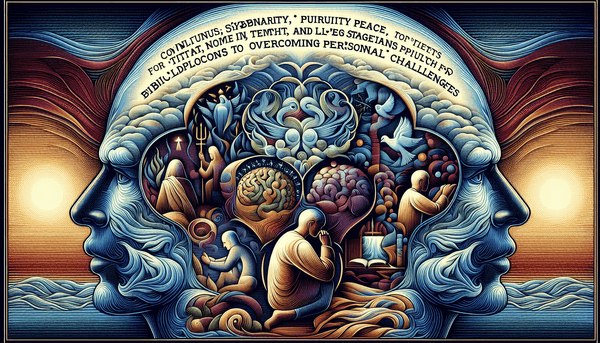Recognizing God as the Ultimate Authority
Christ's words in Matthew 23:9, 'And do not call anyone on earth 'father,' for you have one Father, and he is in heaven,' serve as a powerful reminder of the supremacy of God's authority over all earthly titles and honors. This teaching directs believers to maintain a clear distinction between the respect due to human authorities and the reverence reserved for the Almighty. The Apostle Paul reinforces this understanding, stating that 'there is but one God, the Father, from whom all things came and for whom we live' (1 Corinthians 8:6). The scriptures, including Ephesians 4:6 and Isaiah 64:8, consistently affirm God as the ultimate paternal figure, the one who shapes us and to whom we owe our ultimate allegiance. This notion is further cemented in the Gospel of John, where Jesus himself declares, 'I am the way and the truth and the life. No one comes to the Father except through me' (John 14:6), thus establishing the hierarchical structure of spiritual authority within Christian belief.
Prayer Practices in Christianity
The Apostle Paul's exhortation in 1 Timothy 2:8, 'I want the men everywhere to pray, lifting up holy hands without anger or disputing,' provides a vivid image of the Christian posture in prayer. This gesture of uplifted hands is more than a physical position; it is a spiritual stance of surrender, reverence, and purity before God. The New Testament church embraced this practice, epitomized in the unity and devotion of the early believers, as they 'devoted themselves to the apostles' teaching and to fellowship, to the breaking of bread and to prayer' (Acts 2:42). Additionally, the act of praying before meals, as seen in Luke 11:2 when Jesus teaches the Lord's Prayer, fosters an atmosphere of gratitude and acknowledgment of God's provision. Prayer, in its essence, is an invitation to enter into a harmonious relationship with the Divine, to communicate with the One who invites us to 'pray without ceasing' (1 Thessalonians 5:17) and to do so with a heart free of discord and strife.
The Symbolism of the Lamb's Blood in Christian Redemption
The motif of the Lamb's blood is a powerful symbol of redemption and cleansing within Christian theology. John the Baptist's declaration, 'Look, the Lamb of God, who takes away the sin of the world!' (John 1:29), introduces Jesus as the sacrificial Lamb whose blood would be shed for humanity's salvation. The Apostle Peter elaborates on this redemptive act, explaining that believers were 'redeemed...with the precious blood of Christ, a lamb without blemish or defect' (1 Peter 1:18-19). The book of Revelation, rich in imagery and metaphor, speaks of a multitude who have 'washed their robes and made them white in the blood of the Lamb' (Revelation 7:14), portraying the transformative power of Christ's sacrifice. It is through faith in this sacrifice that believers overcome, for 'they triumphed over [the accuser] by the blood of the Lamb' (Revelation 12:11), emphasizing the profound spiritual metamorphosis available to all who accept the message of the cross.
Conclusion
Through the exploration of these biblical concepts, we gain a deeper appreciation for the enduring truths of Christian doctrine. Endurance, authority, the enigma of Melchizedek, the practices of prayer, and the symbolism of the Lamb's blood all weave together to form a rich tapestry of faith that believers are called to embrace. Reflecting on these themes can challenge and inspire us to live out our faith with greater conviction and to seek a closer relationship with God. If you are eager to explore further, consider the insights from the Apostle Paul's epistle to the Romans, a cornerstone of Christian doctrine that illuminates the power of the gospel and the call to righteous living. May this journey through scripture encourage us to delve even deeper into the living word of God, finding therein the wisdom and guidance for our daily lives.
FAQ
Q: What does Matthew 24:13 mean?
A: Matthew 24:13 emphasizes the importance of perseverance in the Christian faith, suggesting that those who remain steadfast in their beliefs and commitments, despite challenges, will receive the promise of salvation.
Q: Can you offer a personalized devotional based on a specific verse?
A: While I can't provide personalized devotionals, I can guide you on how to reflect on specific verses that resonate with your spiritual journey, encouraging prayer and meditation.
Q: What is the significance of Melchizedek in the Bible?
A: Melchizedek is a mysterious and symbolic figure in the Bible, often seen as a precursor to Christ's priesthood. He is described as the king of Salem and a priest of God Most High, representing a priestly order that predates and foreshadows the eternal priesthood of Jesus.
Q: What does lifting up holy hands in prayer signify?
A: Lifting up holy hands in prayer is a biblical expression of surrender, reverence, and purity. It symbolizes a heart open to God's presence and an act of worship devoid of anger and dispute, as emphasized by the Apostle Paul in 1 Timothy 2:8.






